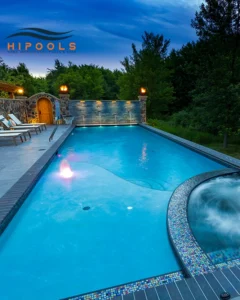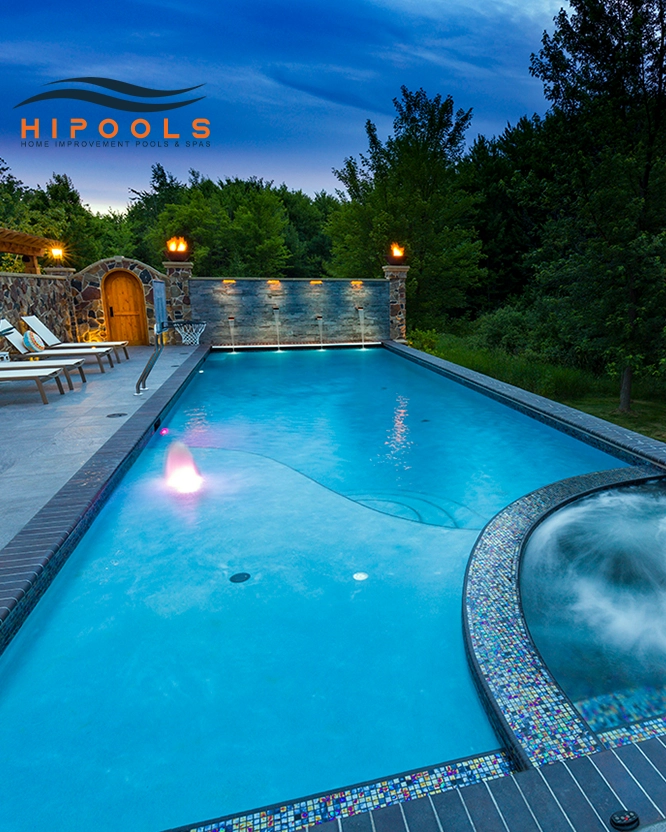Installing a pool is an exciting upgrade, but overlooking permits can turn your backyard dream into a costly nightmare. Local governments require permits to ensure pools meet safety standards, zoning laws, and building codes. This guide explains why pool installation permits matter, how to obtain one, and the risks of skipping this critical step.
Understanding Pool Installation Permits: Compliance, Codes, and Local Rules
A pool installation permit is a legal document issued by your local building authority, ensuring your pool project adheres to safety, zoning, and construction standards. Think of it as a quality assurance check it confirms your pool won’t endanger occupants, neighbors, or the environment. Here’s what permits typically cover:
- Safety Regulations:
- Barrier Requirements: Most areas mandate a 4 foot fence with self-closing/self-latching gates to prevent unsupervised access, especially for children.
- Anti-Entrapment Drains: VGB compliant covers to avoid suction hazards.
- Zoning Laws:
- Setbacks: Distance from property lines, septic systems, or utilities (…, 10,15 feet from your home’s foundation).
- Height Restrictions: For above-ground pools near fences or structures.
- Construction Codes:
- Structural Integrity: Reinforced walls for in-ground pools to prevent collapse.
- Electrical Safety: Ground-fault circuit interrupters (GFCIs) for pumps and lighting.
Permit Requirements Vary By:
- Pool Type: In-ground pools almost always require permits. Above ground pools may need permits if deeper than 24 inches (check local rules).
- Location: Urban areas often have stricter rules (…, NYC’s fencing laws) vs. rural zones.
- Climate: Hurricane-prone regions (Florida, Gulf Coast) may require wind-resistant materials or drainage plans.
Note Tip: Always verify requirements with your city/county building department assuming it’s just a small pool can lead to costly penalties.
Why Permits Are Required: Safety, Legality, and Long Term Value
Skipping a pool installation permit might save time upfront, but it risks fines, safety hazards, and financial headaches. Here’s why permits are non-negotiable:
Safety First
- Child Safety: Drowning is the leading cause of death for children aged 1,4. Permits enforce barriers like fencing, alarms, or pool covers.
- Electrical Compliance: Improper wiring can cause electrocution. Permits ensure pumps, heaters, and lights meet NEC (National Electrical Code) standards.
- Structural Integrity: Permits require engineering checks to prevent wall collapses or deck failures, especially in areas with unstable soil or high water tables.
Legal & Financial Protection
- Avoid Fines: Unpermitted pools can incur daily penalties ($100_$500+) until resolved. In extreme cases, cities may demand pool removal ($3,000_$10,000).
- Insurance Validity: Insurers often deny claims for unpermitted pools. For example, if a guest is injured, you could face lawsuits without coverage.
- Resale Value: Buyers and inspectors will request permits. Unpermitted pools can delay sales or force price reductions.
Real World Example: A California homeowner had to spend $12,000 retrofitting their unpermitted pool with fencing and drain covers to pass inspection before selling.
Key Takeaways
- Permits Protect Everyone: They ensure your pool is safe, legal, and insurable.
- Regional Variations: Coastal areas may require flood proofing; snowy regions might need freeze resistant plumbing.
- Contractor Responsibility: Reputable builders handle permits, but always verify they’re included in your contract.
By securing a pool installation permit, you invest in peace of mind, safety, and long term property value.
Step 1: Research Local Requirements
Why It Matters: Pool regulations differ wildly between cities, counties, and states. Skipping this step risks costly redesigns or fines.
How to Start:
Contact Your Building Department: Visit your city/county website or call their office. Ask for the residential pool permit packet.
Key Questions to Ask:
- What’s the minimum fence height? (Typically 4,6 feet.)
- Are self-closing gates required? (Most areas say yes.)
- Are there setback rules? (Often 5,10 feet from property lines or septic systems.)
- Do above-ground pools need permits? (Usually if deeper than 24 inches.)

Note Tip: Coastal zones (…, Florida, California) may require floodplain permits or hurricane-proof anchors. Mountainous regions (…, Colorado) might need soil stability tests.
Step 2: Prepare Documentation
Gather paperwork to prove your pool meets codes. Missing items delay approvals.
Essential Documents:
- Site Plan:
- Drawn to scale, showing pool location, setbacks, fencing, and utility lines.
- Mark underground gas, water, or electrical lines (call 811 for free utility marking).
- Pool Design Specs:
- Depth, dimensions, and materials (…, fiberglass, vinyl liner).
- Equipment list (pump, heater, filter).
- Contractor Credentials:
- Licensed builders provide proof of insurance and state certification.
- DIYers may need to pass a competency exam in some regions.
Example: A Phoenix homeowner’s permit was denied because their site plan omitted a gas line delaying construction by three weeks.
Step 3: Submit Application & Pay Fees
Costs: Permit fees range from $150_$1,000, based on:
- Pool size (larger pools often cost more to permit).
- Location (urban areas tend to charge higher fees).
- Complexity (add ons like spas or slides may incur extra charges).
Timeline: Approval takes 2,8 weeks. Expedited reviews (for a fee) may shorten this.
Click here for more information about How Long Does it Take to Build a Pool.
What’s Next:
- If rejected, you’ll receive a revision letter outlining fixes (…, adjusting fence height).
- Once approved, display the permit onsite during construction.
Step 4: Pass Inspections
Inspections ensure your pool meets every code before you fill it. Skipping them voids your permit.
Key Inspections:
- Pre Construction:
- Verifies utility lines are marked and setbacks are accurate.
- Required before excavation.
2. During Construction:
- Steel/Electrical: Checks rebar spacing, bonding wires, and GFCI outlets.
- Plumbing: Inspects pipe layout and connections.
3. Final Inspection:
- Safety Barriers: Measures fence height, gate latching, and barrier strength.
- Drain Covers: Confirms VGB compliant anti entrapment covers.
- Water Flow: Tests pumps, filters, and drainage systems.
Note Tip: Schedule inspections 48+ hours in advance to avoid delays.

4. Consequences of Skipping Permits: Risks You Can’t Ignore
While avoiding permits might seem like a shortcut, the fallout can be devastating:
1. Fines & Penalties
- Daily Fines: Many cities charge $100, $500 per day until you comply.
- Retroactive Permits: You’ll still pay original fees plus penalties (…, 2x the cost).
Real Life Example: A Houston homeowner was fined $8,000 for an unpermitted pool and spent $3,500 adding a 6,foot fence to meet code.
2. Pool Removal Orders
Authorities can demand you drain and dismantle the pool even after it’s built. Costs include:
- Demolition: $5,000_$15,000 for in-ground pools.
- Site Restoration: Refilling and landscaping ($2,000_$5,000).
3. Legal Liability
- Insurance Denials: If someone is injured in an unpermitted pool, insurers can refuse claims, leaving you liable for medical bills or lawsuits.
- Criminal Charges: In extreme cases (…, child drowning), negligence charges may apply.
4. Sale Delays & Value Loss
- Buyer Hesitation: 72% of buyers avoid unpermitted homes, per a 2023 Realtor.com survey.
- Appraisal Issues: Unpermitted pools often appraise for 10,20% less.
- Retroactive Compliance: New owners may demand you secure permits before closing.
How to Fix an Unpermitted Pool
- Apply Retroactively: Submit plans and pay fees/penalties.
- Pass Inspections: Upgrade non compliant features (…, fencing, drains).
- Disclose to Buyers: Transparency can prevent legal issues later.
Case Study: A San Diego couple reduced their asking price by $25,000 to offset the cost of retrofitting their unpermitted pool.
Final Checklist for Permit Compliance
| Task | Done |
|---|---|
| Verified local requirements | ☐ |
| Prepared site plan & specs | ☐ |
| Hired licensed contractor (if needed) | ☐ |
| Paid permit fees | ☐ |
| Scheduled inspections | ☐ |
How long does the permit process take?
2,8 weeks. Delays occur if plans need revisions or inspections backlog.
What if my pool was built without a permit?
Apply retroactively, but expect fines and required upgrades to meet current codes.
Do All Pools Require Permits?
| Pool Type | Typically Requires Permit? | Key Considerations |
|---|---|---|
| In-Ground Pools | Yes | Stricter codes for depth and barriers. |
| Above Ground Pools | Often yes (if over 24 deep) | Some areas exempt small kiddie pools. |
| Hot Tubs/Spas | Usually yes | Electrical and fencing rules apply. |

Note Tip: Even if your above ground pool is temporary, check local rules some cities require permits for any structure holding 24+ inches of water.
How much does a pool permit cost?
$150_$1,000, depending on pool size, location, and local fees.
Can my contractor handle the permit?
Yes, but verify they’re licensed and include permit costs in your contract.
Permits Aren’t Red Tape They’re Your Safety Net
At Hipools, we know obtaining a pool installation permit might feel like bureaucracy, but it’s a critical step to protect what matters most:
- Your Family: Compliance ensures child safe barriers, secure electrical systems, and durable construction.
- Your Finances: Avoid fines, insurance denials, or costly retrofits by getting it right the first time.
- Your Home’s Value: Permitted pools attract buyers and safeguard your investment.
Let Hipools Guide You
Navigating permits can be overwhelming, but you don’t have to do it alone. Our licensed, certified experts:
✅ Research Local Codes: We handle city/county regulations, setbacks, and inspections.
✅ Submit Flawless Applications: Accurate plans, specs, and contractor credentials included.
✅ Streamline Inspections: We’re with you from pre-construction checks to final approval.
Don’t Risk It Partner with Pros Who Prioritize Compliance
📞 Call Hipools Today: (770) 250-8579
🌐 Visit: www.hipoolss.com
Skipping Permits = Swimming in Risk
- Fines up to $10,000+
- Forced pool removal
- Legal liability for accidents
Your dream pool deserves a flawless foundation. Trust Hipools to build it right.


No comment